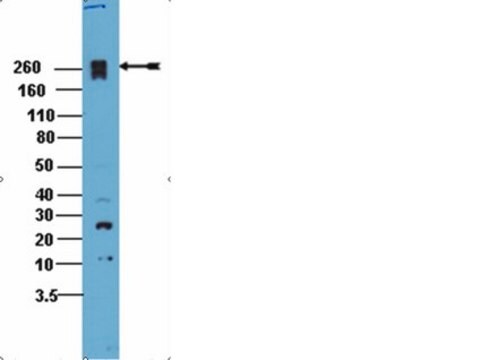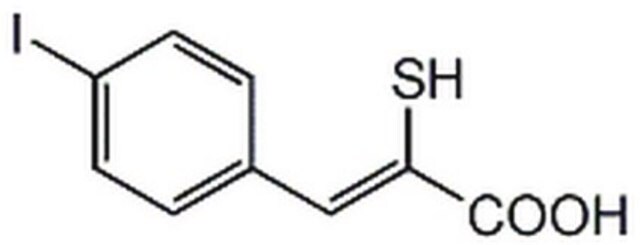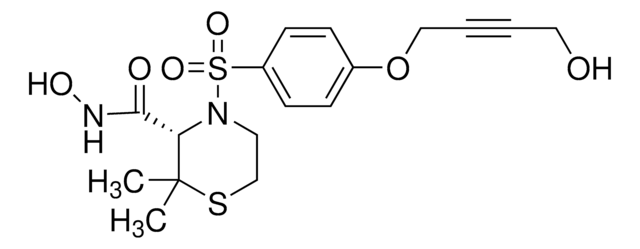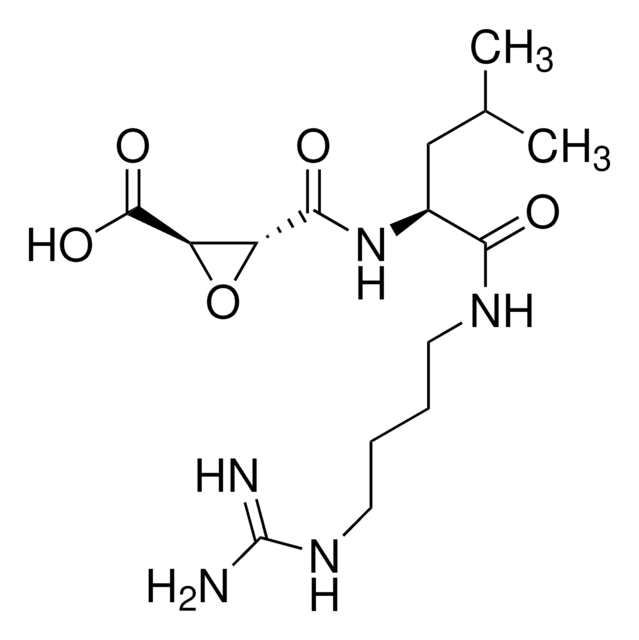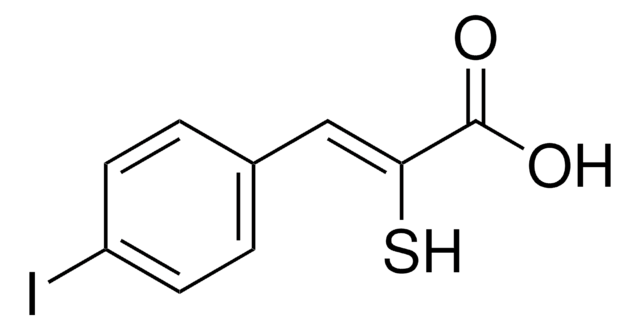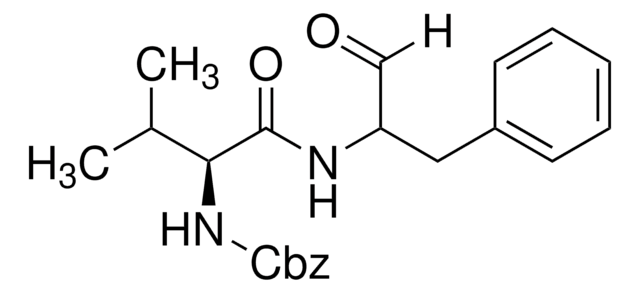208733
Calpain Inhibitor Set
The Calpain Inhibitor Set controls the biological activity of Calpain. This small molecule/inhibitor is primarily used for Protease Inhibitors applications.
Sinónimos:
Calplain inhibitor
Iniciar sesiónpara Ver la Fijación de precios por contrato y de la organización
About This Item
Código UNSPSC:
12352200
Productos recomendados
Nivel de calidad
Formulario
solid
potencia
8 nM Ki
fabricante / nombre comercial
Calbiochem®
condiciones de almacenamiento
OK to freeze
desiccated
protect from light
Condiciones de envío
ambient
temp. de almacenamiento
−20°C
Descripción general
Calpains are a family of calcium-dependent thiol-proteases that act on a wide variety of cytoskeletal, membrane-associated, and regulatory proteins. There are two major isoforms: calpain I (µ-form) and calpain II (m-form), which differ in their calcium requirement for activation Calpains are composed of heterodimers of 80 kDa and a 30 kDa subunits. The 80 kDa unit has the catalytic site and is unique to each isozyme, whereas the 30 kDa unit is the regulatory subunit and is common to both µ- and m-isozymes.
More recently, attention has been focused on the pathological significance of calcium accumulation in the central nervous system following cerebral ischemia and traumatic brain injury. Over-activation of NMDA, kainate, and AMPA receptors in the brain leads to sustained influx of Ca2+ through the voltage-gated calcium channels. Overexpression of calpains has been positively linked to both acute and chronic neurodegenerative processes including ischemia, trauma, and Alzheimer′s disease. In Alzheimer′s disease the ratio of active (76 kDa) to inactive (80 kDa) µ-calpain is reported to be much higher Calpain-dependent proteolysis is usually the late-stage common pathway towards cell death induced by excitotoxic compounds, hence, a selective inhibition of calpains to limit neuronal damage appears to be a viable therapeutic measure.
More recently, attention has been focused on the pathological significance of calcium accumulation in the central nervous system following cerebral ischemia and traumatic brain injury. Over-activation of NMDA, kainate, and AMPA receptors in the brain leads to sustained influx of Ca2+ through the voltage-gated calcium channels. Overexpression of calpains has been positively linked to both acute and chronic neurodegenerative processes including ischemia, trauma, and Alzheimer′s disease. In Alzheimer′s disease the ratio of active (76 kDa) to inactive (80 kDa) µ-calpain is reported to be much higher Calpain-dependent proteolysis is usually the late-stage common pathway towards cell death induced by excitotoxic compounds, hence, a selective inhibition of calpains to limit neuronal damage appears to be a viable therapeutic measure.
Contains 5 mg of ALLN (Cat. No. 208719), 25 mg of Calpain Inhibitor III (Cat. No. 208722), 5 mg of Calpeptin (Cat. No. 03-34-0051), 1 mg of EST (Cat. No. 330005), and 5 mg of PD 150606 (Cat. No. 513022).
Acciones bioquímicas o fisiológicas
Cell permeable: yes
Primary Target
calpain 1, calpain 2
calpain 1, calpain 2
Reversible: no
Envase
Packaged under inert gas
Advertencia
Toxicity: Multiple Toxicity Values, refer to MSDS (O)
Otras notas
Johnson, G.V.W., and Guttmann, R.P. 1997. BioEssays19, 1011.
Kampfl, A., et al. 1997. J. Neurotauma14, 121.
Sorimachi, H., et al., 1997. Biochem. J.328, 721.
Bartus, R.T., et al. 1995. Neurol. Res.17, 249.
Wang, K.K.W., and Yuen, P-W. 1994. Trends Pharmacol. Sci.15, 412.
Saito, K., et al. 1993. Proc. Natl. Acad. Sci. USA90, 2628.
Goll, D.E., et al. 1992. BioEssays14, 549.
Kampfl, A., et al. 1997. J. Neurotauma14, 121.
Sorimachi, H., et al., 1997. Biochem. J.328, 721.
Bartus, R.T., et al. 1995. Neurol. Res.17, 249.
Wang, K.K.W., and Yuen, P-W. 1994. Trends Pharmacol. Sci.15, 412.
Saito, K., et al. 1993. Proc. Natl. Acad. Sci. USA90, 2628.
Goll, D.E., et al. 1992. BioEssays14, 549.
Información legal
CALBIOCHEM is a registered trademark of Merck KGaA, Darmstadt, Germany
Código de clase de almacenamiento
11 - Combustible Solids
Clase de riesgo para el agua (WGK)
WGK 3
Certificados de análisis (COA)
Busque Certificados de análisis (COA) introduciendo el número de lote del producto. Los números de lote se encuentran en la etiqueta del producto después de las palabras «Lot» o «Batch»
¿Ya tiene este producto?
Encuentre la documentación para los productos que ha comprado recientemente en la Biblioteca de documentos.
Los clientes también vieron
Nuestro equipo de científicos tiene experiencia en todas las áreas de investigación: Ciencias de la vida, Ciencia de los materiales, Síntesis química, Cromatografía, Analítica y muchas otras.
Póngase en contacto con el Servicio técnico